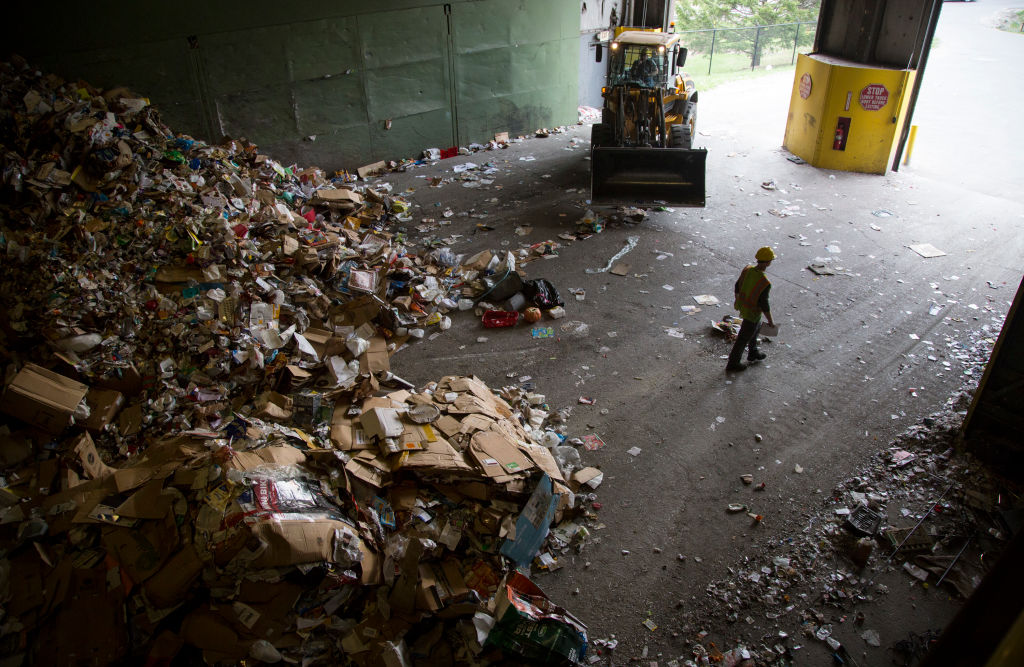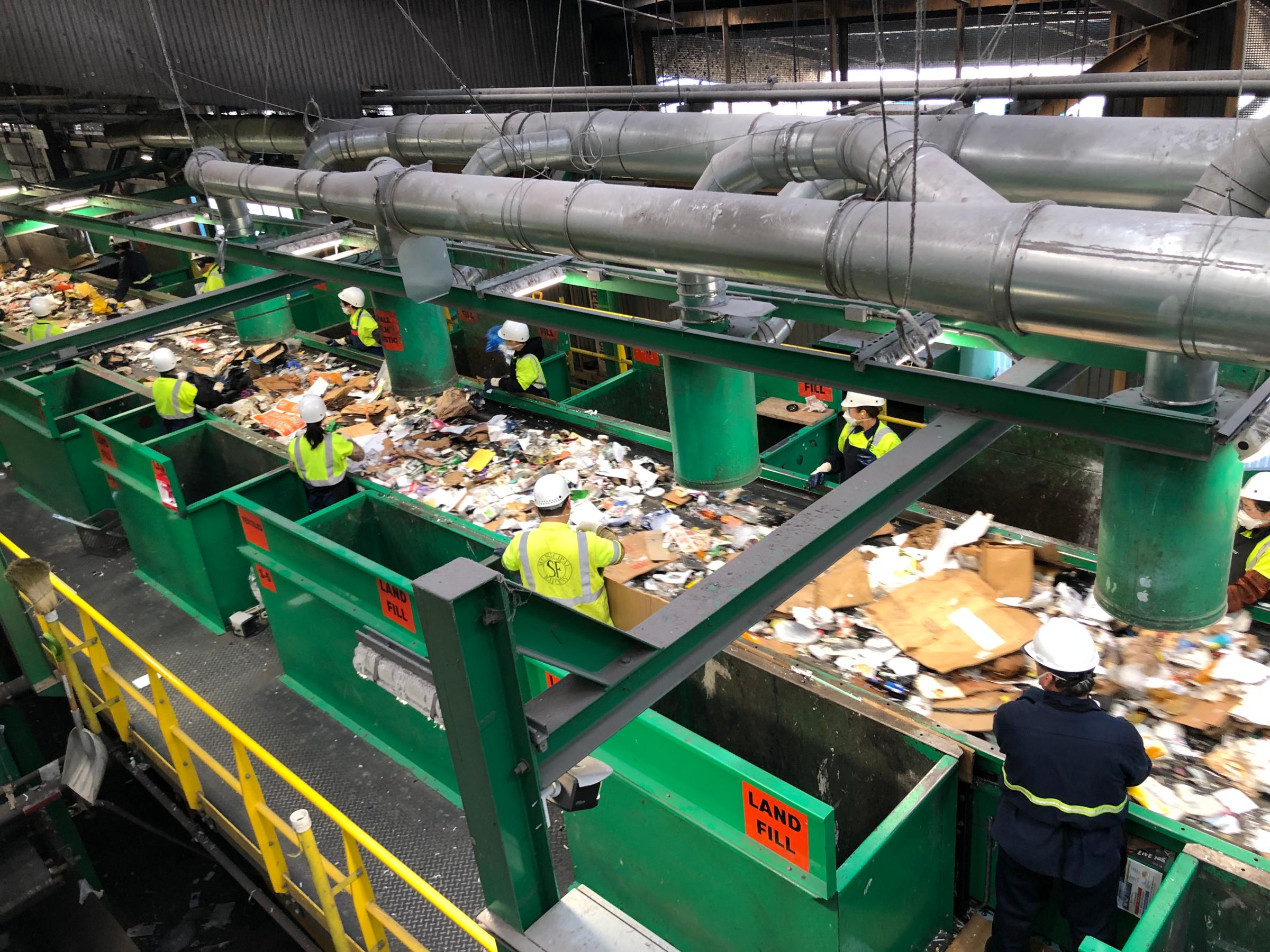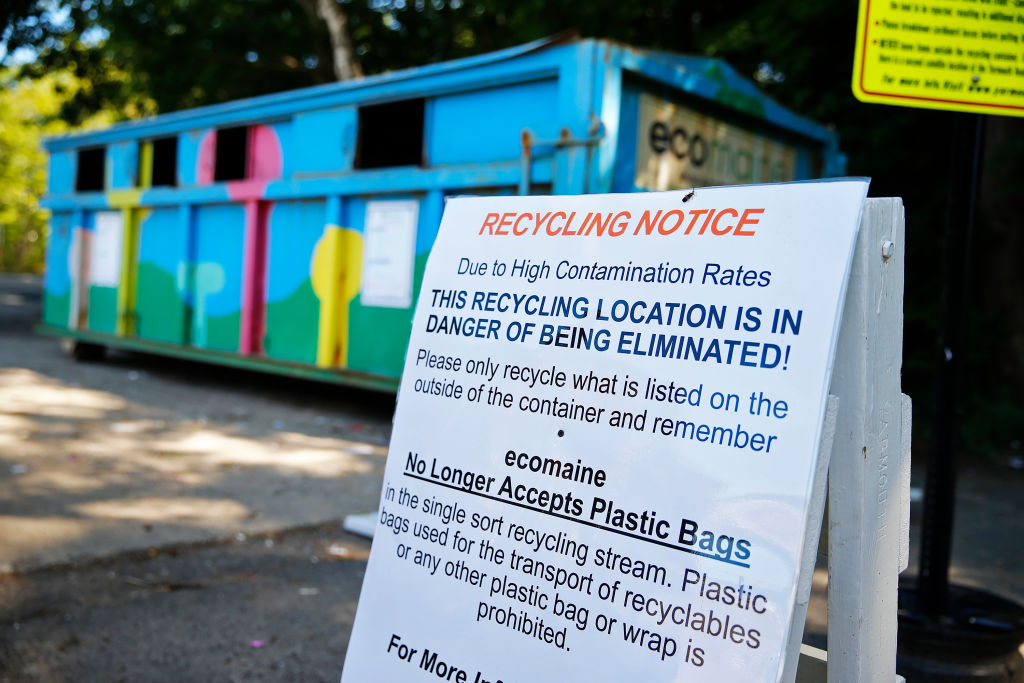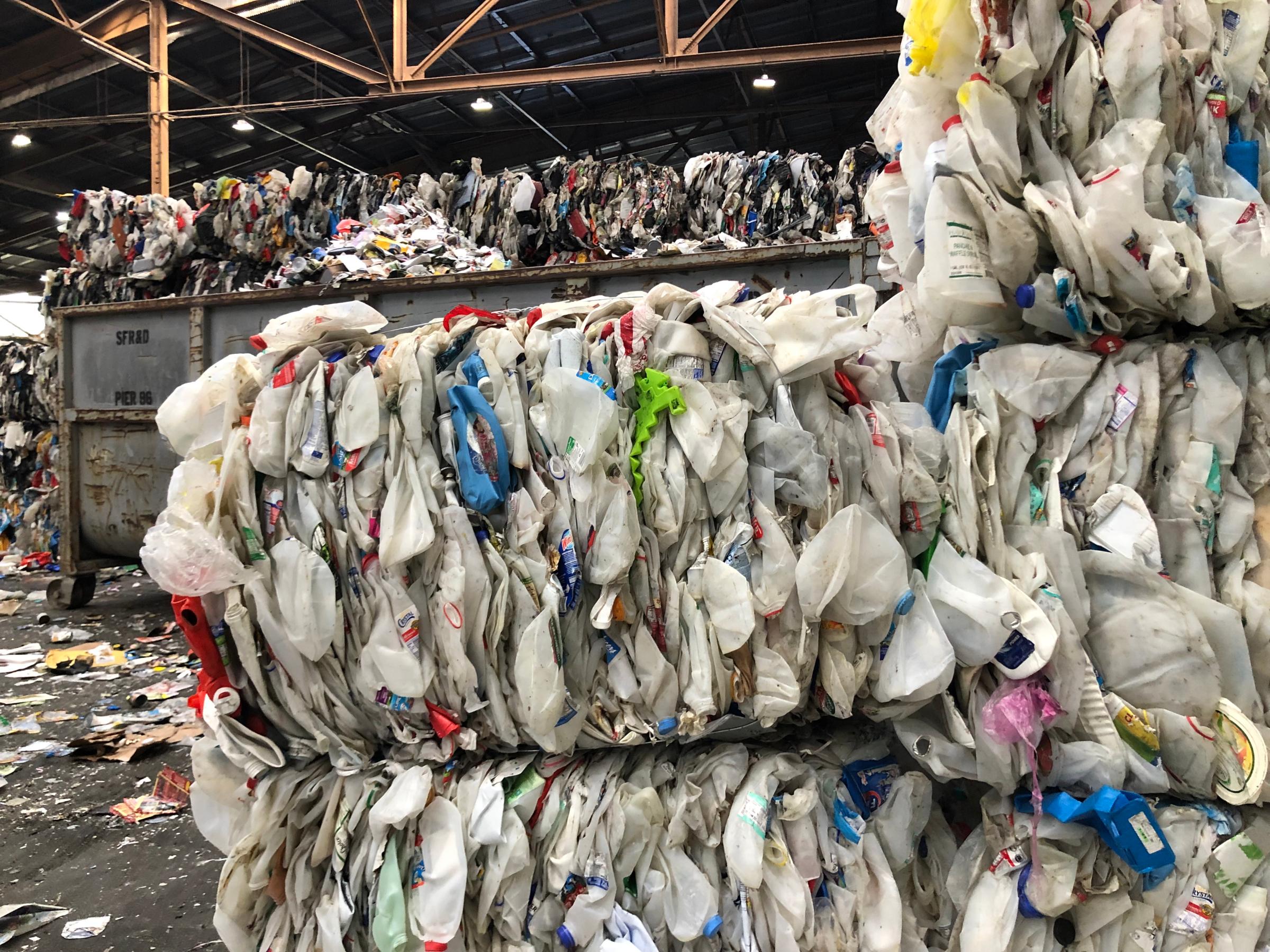
Like many people of her generation, Shelbi Orme, 27, is an ardent environmentalist. On her YouTube channel, where she calls herself “Shelbizleee” (rhymes with Twizzle), she shares tips with her 200,000-plus subscribers about how to live more sustainably, like catching shower water in a bucket as it is heating up and using it to water plants.
But when it came to creating less trash, Orme hit obstacles. She strove to show her followers how to be zero waste, by making sure nothing she consumed ended up in a landfill, but found it all but impossible. Many of the products she hoped to recycle would end up in a landfill, she discovered—only half of all packaging and paper products are recycled. Living the type of comfortable life to which most Americans are accustomed, Orme kept ending up with things that wouldn’t be recycled in most places, like bottle caps that fall out of the recycling stream and the flimsy plastic bags that hold food like tortillas.
Recycling became even more difficult after China said in January 2018 that it would stop accepting many types of recycling the U.S. had long sent. Cities that had been paid for their recycling soon were paying for recycling pickup, and faced with a national annual loss of $400 million in revenue, either stopped collecting recycling or sent what they had to the incinerator. More than 60 cities and towns ended their curbside recycling programs, including Kennebunkport, Maine, which was faced with $150,000 in extra costs after China implemented what it called the “National Sword” policy.
So Orme gave up on zero waste. “It’s not your fault,” she told viewers in a video in 2018, advising them to try to be “low-impact” instead. Her fans—makeup artists and teens living far from organic grocery stores—had been writing in saying they felt guilty about their inability to be zero waste. “A lot of those things, truthfully, are completely out of your control,” she said. “The infrastructure from the companies is not set up for you to make these decisions.”
Now, some elected officials are trying to change that. For too long, they say, the burden of recycling has fallen on consumers. Companies tell their customers to recycle plastic bags or throw yogurt containers in the correct recycling bin, without trying to make sure the products they sell are easily recyclable in the first place. Then, cities and towns have to sort through the recycling to remove potential contaminants like chips bags or greasy pizza boxes. Only 9% of plastic products are recycled.
That’s why a growing chorus of cities and towns across the U.S. now support laws that would force the companies who make products pay for the cost of recycling or disposing of these products when consumers are done with them. These laws, called extended producer responsibility (EPR) for packaging bills, shift those costs from consumers and cities to the companies selling the products in the first place. States including New York, Massachusetts, and Washington are considering EPR-for-packaging bills, and Maine seems poised to pass one in the next few months. Maine’s legislature already passed a law last year directing the state’s Department of Environmental Protection to draft legislation to establish an extended producer responsibility law for packaging in the state. “Governments can no longer ignore the fact that the recycling system is not working,” says Scott Cassel, chief executive of the Product Stewardship Institute, a Massachusetts-based environmental group supporting these EPR laws.

Support for Maine’s law comes from many towns in the state whose recycling costs went up so much that they’re struggling to keep their programs going. The town of Windham, Maine, which never had to pay for recycling pickup before, now has to pay $35 a ton for recycling; if the recycling is more than 25% contaminated with things that can’t be recycled, the town has to pay $130 a ton, and the load ends up in the landfill, says David Nadeau, a town councilor. Since people “wish-cycle,” and throw things in the recycling that contaminate the bins, the town is increasingly finding that recycling is significantly more expensive than just putting everything in a landfill.
One of the big problems facing towns in Maine and across the country is this sort of contamination. Some plastic and paper packaging can be recycled, but only if it isn’t also combined with other things like food waste, metal, and non-recyclable plastic. Most recycling facilities use automated Rube Goldberg-esque contraptions to separate plastic from paper from metal, but plastic bags and plastic film (like dry cleaner bags) can gum up the equipment and shut down the plant. The cost of operating these facilities has only grown as buyers of recycled plastic demand less and less contamination. To help sort through materials, many recycling facilities are adding workers, which increases costs.
Windham hired interns to go around town educating people on what is and isn’t recyclable, but the town doesn’t have the money to do that year-round. What would be simpler, says Nadeau, is if products were more easily recyclable. “If the burden of making it simple doesn’t come to the manufacturer,” he says, “this isn’t going to work.”
Maine’s bill, An Act to Support and Increase the Recycling of Packaging, would create a Producer Responsibility Organization (PRO) comprised of companies with more than $1 million in annual revenue or that sold material weighing more than one ton in Maine. The organization would charge the companies based on the weight of packaging they sell in the state, and those fees would go to cities and towns to help pay for recycling. If a package is easily recyclable, a producer pays a lower fee. If it isn’t, the producer pays a higher fee. The PRO can also advise companies on how to lower their costs, by informing them what types of packaging are causing problems for recyclers says Sarah Nichols, the Sustainable Maine director of the Natural Resources Council of Maine, which helped craft the bill. Black plastic is extremely difficult to recycle, for instance, because many of the optical sorters at recycling centers can’t see it, but many companies simply aren’t aware of that, she says. Maine will hold a public hearing on the bill on February 26.
The U.S. is one of the only developed countries without EPR bills addressing packaging. Germany enacted a “producer pays” law in 1991, and manufacturers have to collect, sort, and recycle packaging after consumers finish with it; similar laws were expanded to the whole European Union in 1994. Dozens of other countries, including Brazil, Estonia, Japan, Turkey, and South Africa now have EPR laws for packaging. And there are EPR laws for some products in the U.S.—Cassel counts 119 EPR laws in 60 jurisdictions, encompassing 14 different products, including paint and carpets.
Once producers have to pay for the cost of recycling, they’ll start to make products more easily recyclable, says Heidi Sanborn, the executive director of the National Stewardship Action Council, which advocates for a circular economy, in which all products are reused rather than trashed. In Belgium, for instance, after EPR-for-packaging laws were introduced, manufacturers hired three full-time designers to help them redesign packages so that they were more recyclable.
Some types of recyclables, like paper and thick plastic like milk jugs, are easy to sell to contractors who can find a place to recycle them into material that can be used again. But flimsier plastic like cutlery, juice boxes, and bubble wrap, are more difficult to turn into other products. Right now, though, Sanborn says, packaging manufacturers in the U.S. pay the same cost, regardless of what they use to make their product: absolutely nothing. If they were charged based on how difficult it is to recycle their product, they might change its ingredients. EPR, she says, is a more effective strategy than trying to ban certain types of plastics, like straws or bags, or charging consumers extra for those products. “If you want to reduce pollution without more regulation,” she says, “you make the producer pay.”

Unsurprisingly, producers have opposed past attempts to make them pay for recycling. A California bill that would have required producers to recycle waste generated from their products was tabled last year; a group representing producers, Californians for Recycling and the Environment, spent more than $2 million lobbying against it last year, according to campaign finance data. A bill introduced in Washington last year was turned into a “study bill” so that the state had to perform a study on EPR before passing any legislation; ten members of the Washington Senate committee considering the bill had received campaign contributions from the American Chemistry Council, which represents manufacturers of plastic products, according to campaign finance data. A bill in Connecticut also met opposition from the waste hauling industry.
Manufacturers even created an industry group, Ameripen, to oppose EPR legislation, according to Cassel. (Ameripen said it would be “premature” to comment on any pending legislation in response to TIME’s request for comment.) At the national level, four Congressional Democrats introduced an EPR bill called Break Free From Plastic Pollution Act earlier this month, but it has little chance of passing a divided Congress. Ameripen and other anti-EPR organizations try to sow doubt and raise irrelevant questions, says Cassel, who likens the strategy to trying to create static on a radio so that a message can’t be heard clearly. “They are very successful at creating that static,” he says.
Maine’s law, too, faces strong industry opposition. Ameripen submitted testimony on Maine’s 2019 bill that directed the state Department of Environmental Protection to establish an EPR program. The industry group argued that the legislation wouldn’t reduce costs to taxpayers or incentivize producers to change their packaging. “We urge the Committee to avoid approaches, such as EPR, that merely shift costs and do not change consumer behavior,” Ameripen wrote. The Plastics Industry Association also submitted testimony, saying that EPR laws “burden producers with the responsibility of implementing a collection system for their products” even though producers of packaging are not in the business of waste management. It further elaborated, in a statement to TIME, that every EPR proposal introduced has been “flawed,” and that the title of the bill introduced to Congress, the “Break Free from Plastic Pollution Act of 2020,” “suggests that it is more interested in garnering headlines than it is in finding solution.” The Consumer Technology Association claimed, in testimony submitted in Maine, that a state-to-state patchwork of EPR laws creates inefficiencies and costs the electronics industry hundreds of millions of dollars. The association did not reply to TIME’s request for comment.
Some producers agree that pollution is a problem, but want to be allowed to take care of it themselves. “Our specific concerns have to do with the heavy-handedness of the regulatory approach,” says Terry Webber, the executive director for packaging at The American Forest & Paper Association, which also opposed the Maine bill. Around 68% of paper products were recovered for recycling in 2018, because paper-product manufacturers have invested in making recycling easier, he says. They did that without government intervention. There is a market for recycled paper, and companies break it down to fiber to create new boxes and other products. “The success we have achieved with recycling has been because of the free markets,” he says.

But there aren’t markets for some types of packaging, including many plastics. In many cases, it’s much cheaper to make virgin plastic than it is to turn recycled plastic into a usable product. And even if plastic coffee pods or chip bags are labeled “recyclable,” there’s a big chance they’re not getting recycled, according to a report from Greenpeace released on February 18. Only plastics labeled #1 and #2 (which include most soda and water bottles, milk jugs, and shampoo bottles) are easily recyclable, the report found. Those labelled 3-7 (such as yogurt or cottage cheese containers and clamshell containers that hold produce) “cannot be legitimately claimed as recyclable in the U.S.,” Greenpeace concluded, because few companies collect and recycle them into new material. Yet most people assume that anything with a recycling symbol on it gets recycled, which, research suggests, convinces them to buy more of it. In other words, recycling labeling can actually create more waste
The Maine bill would help create a more robust market for recyclables in Maine, says Kevin Roche, the CEO of Ecomaine, which provides solid waste and recycling services to 70 communities in the state. Once materials such as Styrofoam and straws and plastic lids stop ending up in the waste stream, Ecomaine will have lower contamination rates, and be able to sell its recycled plastics, he says. “We want there to be an incentive for a producer to package something in a readily recyclable container,” Roche says.
The impact of the bill could go far beyond Maine. There’s a history of EPR laws starting local and spreading nationally. After Oregon passed an EPR bill for paint in 2009, nine states followed with similar legislation. After the National Stewardship Action Council convinced Alameda, a county in California, to pass an ordinance requiring drug companies pay to design and operate a program that takes back unused drugs in 2014, other counties soon followed suit. “Everyone said to me, ‘You’ll never get the pharmaceutical industry to pay to take back drugs,’” says Sanborn, of the National Stewardship Action Council. “That was the hardest, but we did it, and it paves the way for the rest to come a lot easier.”
Cities across Maine say EPR is one of the only solutions left for their recycling woes. Portland, Maine’s most populous city, started a “Pay As You Throw” program in 1999, requiring residents to buy and dispose of their trash in city-branded trash bags that cost more than regular bags. The program incentivized recycling and made people consider how much they were throwing away, says Troy Moon, Portland’s sustainability coordinator—waste disposal went down 60% since then and recycling grew 600%. But plastic bags and plastic film and Styrofoam are still gumming up the city’s recycling bins, Moon says. Portland banned the sale and distribution of plastic straws and now requires customers to pay five cents for single-use bags. It banned Styrofoam takeout containers and encourages residents to bring their own mugs to coffee shops to be filled. But it’s still paying $200,000 a year more than it did before China banned the import of most recycling. No matter what Portland does, the waste keeps flowing.
There’s only so much individual consumers can do. They’ve learned, over decades, to make recycling a habit. But there are some obstacles keeping recycling from working the way it should. It’s time, Moon, for companies to pitch in. “Without EPR, there’s no incentive for manufacturers to reduce the amount of recycling,” he says. “If they have skin in the game, they are apt to take it more seriously.”
More Must-Reads from TIME
- Donald Trump Is TIME's 2024 Person of the Year
- Why We Chose Trump as Person of the Year
- Is Intermittent Fasting Good or Bad for You?
- The 100 Must-Read Books of 2024
- The 20 Best Christmas TV Episodes
- Column: If Optimism Feels Ridiculous Now, Try Hope
- The Future of Climate Action Is Trade Policy
- Merle Bombardieri Is Helping People Make the Baby Decision
Contact us at letters@time.com